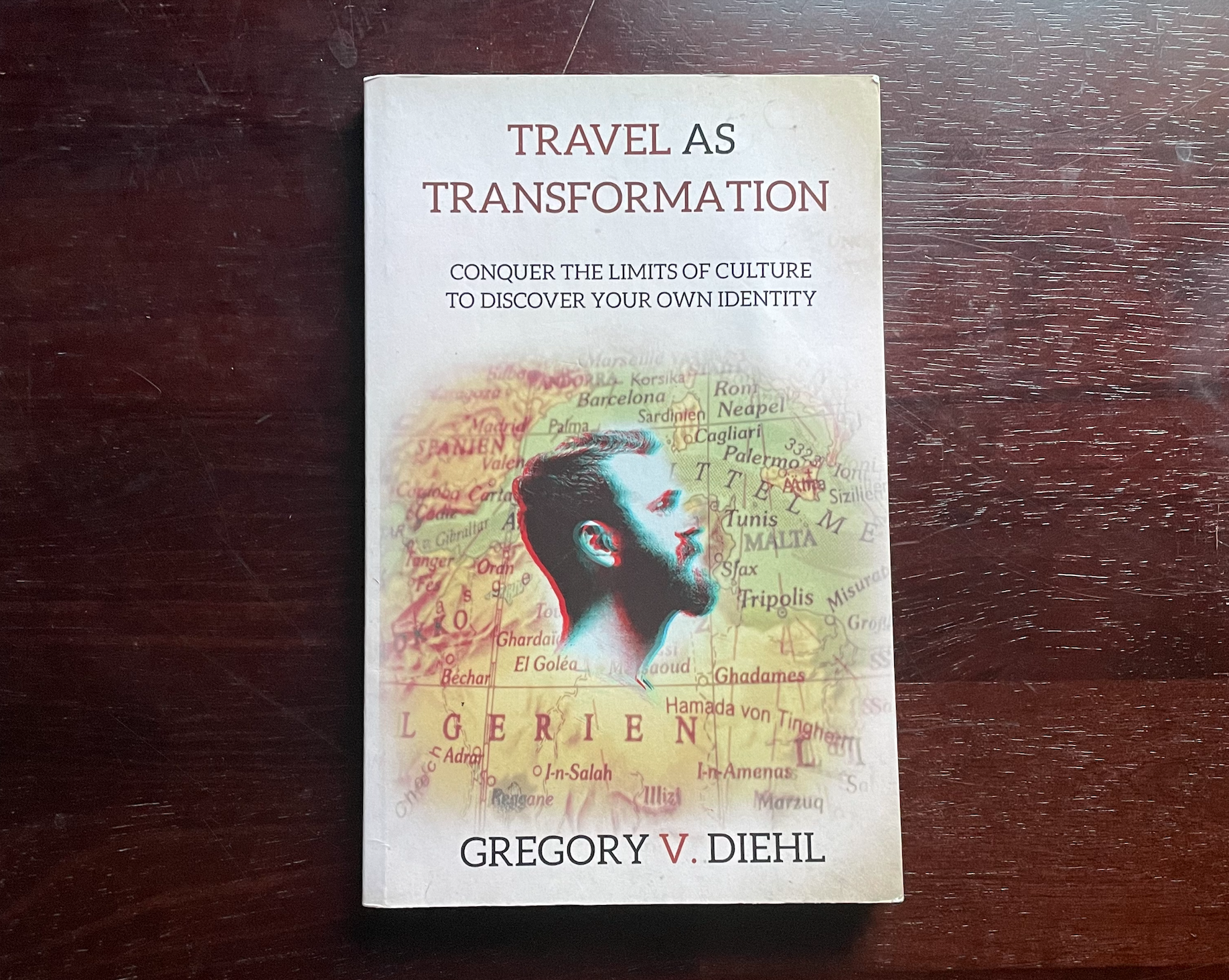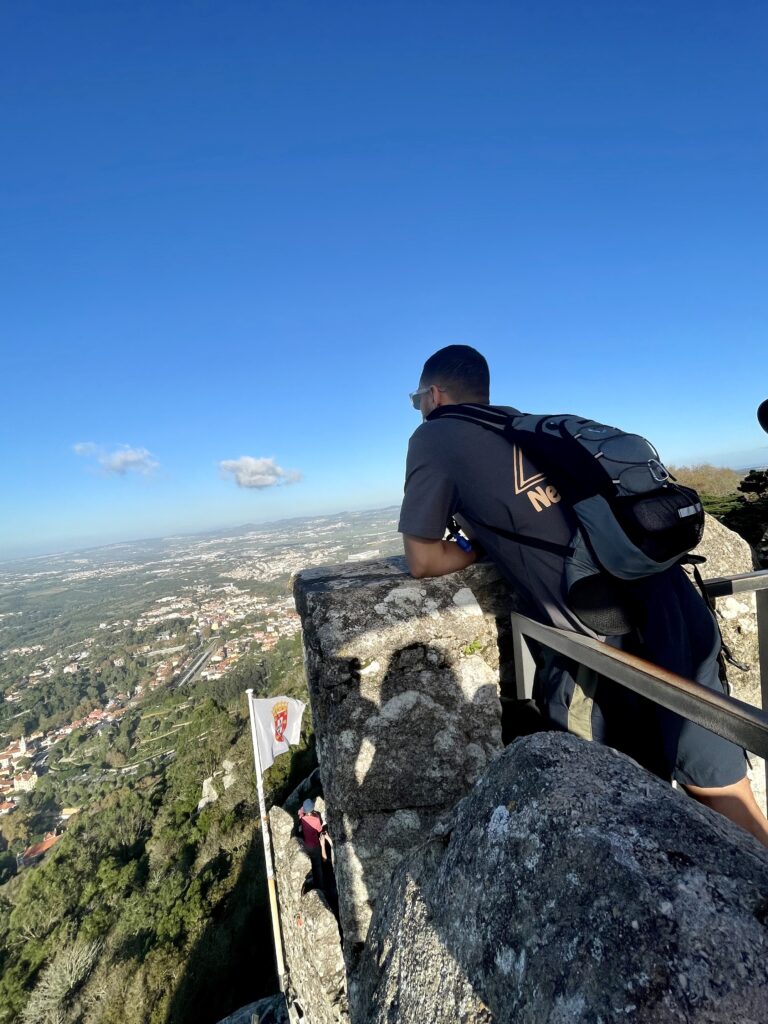In this post, I’ll be reviewing Travel as Transformation: Conquer the Limits of Culture to Discover Your Own Identity by Gregory Diehl.
A Brief Summary of Travel as Transformation
The title of Travel as Transformation captures the content of the book perfectly. In this book, Gregory Diehl, best-selling author, personal development mentor, and founder of Identity Publications, shares with readers some of his travels experiences and the multiple ways in which they have constructed his identity and outlook on life.
His main point is that much of who we think we are is derived from the cultural setting we inhabit. Diehl suggests that the things we find sacred about our identity and the incredibly strong ideas we have about the core of our being are more a reflection of who and what we’re surrounded by, as opposed to something internal.
He reminds readers about the importance of truly understanding this so that we can break free from ideas, desires, and mindsets that limit us from discovering our true identities. One of the ways to get to such a mental space is to get out and see the world.
Though Diehl mentions several times throughout Travel as Transformation that travel was his specific strategy for identity creation and need not be everyone else’s, the insights he shares about travel, specifically, are compelling and will likely urge those who have never considered travel to book their next flight.
“To travel with an open mind is to forget who you were when you started.”
— Travel as Transformation (Diehl, 2016, p. ix)
As you all can probably tell by reading my other book reviews, I love quoting directly from books. While I normally try not to overdo it, it’s a bit more difficult in my review of Travel as Transformation. There are just so many gems sprinkled throughout. The quote above is no exception.
First Step Toward Transformation: Destroying
Diehl is trying to get readers to see that, contrary to popular belief, long-term travel isn’t about going out there to find yourself. Rather, it’s about intentionally destroying who you thought you were—at least that’s the first step.
It’s a somewhat subtle, yet important distinction from people who say they’re going to take time off to travel and find who they really are.
“With travel comes the freedom to break away from what one has always known and explore, for the first time ever, what it is that makes one who they really are”
— Travel as Transformation (Diehl, 2016, p. xi)
Diehl is telling us that we no longer have to be the person we were before. In other words, the memories we previously had may be remembered differently and those activities we thought we loved might no longer be fulfilling in the same way.
I loved this perspective for so many reasons and thought I necessary to emphasize in my review of Travel as Transformation.
The main reason is that it’s an intentional process. Getting out there, especially on your own, you’re able to think deliberately about the countless elements that comprise your identity.
Once you’ve reflected, as Diehl would have it, you’ll know what needs to change internally for you to be the person you really want to be.
I can SO relate to this.
“No one finds their real self ‘out there’ in the world. Freedom is not a target to chase or an object to pursue. Attention must be turned inward to the invisible restraints we all carry”
— Travel as Transformation (Diehl, 2016, p. xiii)
My first few weeks in Buenos Aires have come with a lot of ebbs and flows, but through everything I’ve been able to take a step back to think about who I want to be in life and how I want to show up in the world.
No doubt about it, I’m still in the destroying phase. As uncomfortable as it has felt at times, I’m grateful that I have the opportunity to do it and am curious to see what I look like on the other side.
Second Step Toward Transformation: Discover
Okay, you’ve destroyed who you thought you were. What do you do now?
It’s time to discover, just like you used to do when you were a child.
Diehl means a few things when he refers to discovering.
First and foremost, it entails discovering the strength and resilience you might not have thought you had. By getting out there in the world and facing uncomfortable and uncertain situations, you discover that you’re able to do it, and do it well, at least some of the time. He reminds us that even when you “fail”, you realize it’s not that scary out there, which can be very empowering.
What I also understood from Diehl’s thoughts on discovery is that you discover what you like about yourself and what you like to do—free from the constraints of your comfortable life.
To be clear, this, too, is intentional. You don’t just discover your interests out of nowhere, but you experiment with different things, especially those you would never have imagined yourself doing. Then you see what clicks.
“It was a new set of boundary conditions from which I could explore the principle of my identity. I was free to think about what I really wanted to do with my time, based on my genuine values”
— Travel as Transformation (Diehl, 2016, p. 19)
This was another relatable point, one I needed to emphasize in my review of Travel as Transformation.
In my first week in Buenos Aires, I tried boxing classes, yoga, rugby, and played basketball with people I met online. Aside from rugby, I had tried all these things before. Yet, four years in Miami—in my comfortable 9-5 office job life—and I never once sought any of those activities.
While in some ways trying these new things came naturally, I also intentionally sought them to (re)discover what I find to be enjoyable and, potentially in the long run, passionate about.
Last Step of Transformation: Renewing
This is where things get even more interesting.
Diehl says that as you begin destroying and discovering, you also start to create yourself anew. Someone who is free from the limitations of the past.
“I was ready to begin the most rapid personal expansion of my life. This would never have been possible had I not removed myself from my ordinary environment. When my old rules for life didn’t matter anymore, I was free to choose my own path. I could explore what the vital parts of my identity were when context was stripped away.”
— Travel as Transformation (Diehl, 2016, p. 18)
At this stage, you start to do things you love without worrying about what others or your past self will think about what you’re doing.
I could not stop thinking about how much sense this made to me. It just clicked and I said to myself, “I’ll never be able to create a new identity if I’m still using my same cultural lens to think about who I am and what I want in life”.
It also made me question continuing to pursue my degree.
I love being a student but the more I think about it, the more I’ve realized that pursuing a doctoral degree has been very much rooted in what is looked upon as desirable in my society.
Can any of you relate to this?
“As you expose yourself to novel circumstances abroad, you are going to change in unseen and uncountable ways. You will become something more than what you were when you first started.”
— Travel as Transformation (Diehl, 2016, p. 41)
Another part of the book that caught my attention was the way your orientation to the world will change once you start doing more things you find fulfilling. Diehl posits that by doing these things you find joy and fulfillment in, money and opportunities will come your way because you’ll be inherently “shifting reality toward the type of world you want to live in” (p. 119).
What would it mean for each and every one of us to prioritize the things we love as opposed to what we think we should be doing?
Main Message in Travel as Transformation
Though Travel as Transformation is heavily skewed toward those with an interest in travel and might not read as profoundly to people who aren’t interested in travel, Diehl does a good job at toeing the line.
Still, while he does make attempts to tell readers they don’t necessarily need to follow a similar path that he took when it comes to travel, there’s no doubt that he believes travel is probably the best way to create your identity. I think he sums it up well when he says:
“By intentionally exposing yourself to new influences, you cannot help but make meaningful progress”
Travel as transformation (Diehl, 2016, p. 79)
In general, I feel he does a good job getting his points across without trying to get readers to see it exactly the way he does.
“My ambition is to promote the critical growth of your own curiosity and the utter demise of your fear”
— Travel as Transformation (Diehl, 2016, p. 5)
He also has a way of pushing and challenging readers without making them feel bad about where they’re at. I walked away feeling a bit regretful that I had not made certain moves earlier in life, but also really motivated to continue on the path of travel I’m currently on.
I can imagine that someone who is not on this path yet will feel a jolt of inspiration that helps them pull the trigger.
I read Travel as Transformation at the perfect time
If you can’t already tell, Travel as Transformation resonated with me a ton.
First off, a lot of the concepts I found most impactful reminded me of a lot of The Pathless Path, a book that has been formative in my outlook toward life. From questioning your life critically to experimenting with things you find enjoyable to facing uncertainty, both Diehl and Paul Millerd cover a wide range of topics that encourage readers to take action.
Another reason Travel as Transformation was so influential is the time in my life in which I read it. I first picked it up during my first week in Buenos Aires and it could not have been more appropriate.
It has reminded me of the importance of leaving “home” where home is; not bringing it with me, along with who I thought I was, on this new chapter.
Through Diehl’s writing, I’ve also become more aware of just how little I know myself. Who am I, really, without the societal norms and pressures I’ve grown so accustomed to throughout my life?
Wherever you are on your journey, if you’re reading this blog, it’s likely that you, too, have been questioning very similar things.
For that reason, and because it’s simply a great read, I highly recommend picking up a copy of the book.
I hope you’ve enjoyed my review of Travel as Transformation.
‘Till Next Time, Travel Friends








One response to “Reviewing Gregory Diehl’s Paradigm-Shifting “Travel as Transformation””
[…] I’m feeling more confident and willing to try new things, as opposed to doing the same old things that I was used to doing back home. I can’t help but think that travel and switching up my environment have played a substantial role in who I’m becoming. […]